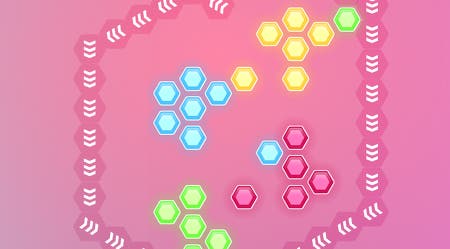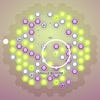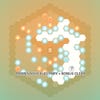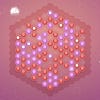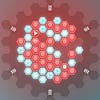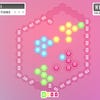Fractal: Make Blooms Not War Review
War of the hexes.
Puzzle games that trade in honeycomb hexagons crowd the gaming landscape. But Fractal: Make Blooms Not War (from Auditorium and Pulse developer Cipher Prime) shares only a few strands of DNA with the tired match-3 genre, instead asking that players clear seven like-coloured hexagons in a game of block shunting of often confounding complexity.
The rules are disarming in their simplicity - but it takes time before you begin to feel out the boundaries of possibility and strategy. You must clear a set number of hexagons by tapping on empty spaces on the grid. Doing so pushes the adjacent tiles outwards by one space, creating new hexes in the displaced spaces. Create a grouping of seven hexes in the 'push' and they disappear in a particle-spewing 'bloom', moving you seven points closer to the total to clear the level.
The campaign is spread across 30 levels that scale in difficulty faster than most puzzle games of this ilk. Before you make it out of the first third of the game you will be juggling multiple colour hexes on the grid (only like-coloured hexes can be matched together), while the introduction of mines and a lightning tile that clears all connected tiles of the same colour introduces an element of semi-unforeseeable randomness to keep things dynamic and unexpected.
Cipher Prime works hard to inject what might otherwise have been a somewhat staid and cerebral experience with arcade fizz. Bombastic messages streak across the screen as blooms trigger, while the discrete outputs aggregating towards your score in any single 'push' stack on screen in a pleasing read-out. Knowing how many turns you have left before you run out of 'pushes' allows you to plan ahead and set the board for sweeping chain reactions, and the thrill of knocking these down and watching the domino effect more than makes up for the sense of inscrutability you feel while learning the basic game and developing early strategies.
Beneath the blustering overlay, Fractals is a beautiful game, marrying the elegance of its arithmetical visual logic with a colour palette delicately pipetted from nature: washed-out sunset oranges blend with noonday yellows, while fuchsia pinks and sub-zero blues edge each hexagon. The play area is focused in the centre of the screen, the surrounding empty space giving you room to think. Its expanse is interrupted only by the odd stylish font indicating how many 'pushes' you have left, or how many tiles you have cleared.
While the music has no bearing on the mechanics, there's a Lumines edge to the game's aesthetic that's amplified by strong use of effects and tender ambient soundtracking. Indeed, just as the puzzle games that swamp the free web-game market grow ever-more visually noisy in an effort to grab the attention of passers-by, so Fractal's roomy yet focused aesthetic is especially appealing, and the moment-to-moment experience of playing the game is richer and more enjoyable for it.
Despite the visual simplicity of the game, its complexities run deep - and there are no concessions to beginners. After the first few introductory levels are cleared, many players will hit a wall that's only overcome through repetition and learning. Indeed, newcomers would do well to start in the Puzzle mode, where the mechanics are broken apart into 60 more easily digestible stages.
Even so, there's a heavy sense of unpredictability to the game in its more advanced stages - one that even the most logic-minded player will struggle to tame. Often, it's too hard to read the board further ahead than two to three moves, something that makes conquering levels as much a war of attrition as one of planning and ambition.
Elsewhere, there's a three-part Arcade mode, allowing you to choose a play style that focuses on speed or strategy as you clear hexes in order to refill your timer against a brutal time limit. Here you have unlimited pushes (something that encourages you to throw hexes at the board as quickly as possible when you first start out). Score attack is the name of the game, with options for sharing your highest scores across social networks.
Original, smart and stylish, Fractal is a game that walks a fine line between frustrating and thrilling. Despite the hard logic of its hexes and the rules that surround them, once multiple colours and special-case hexes are introduced, it can appear too random to be truly mastered. (Although you might argue that the sense of randomness principally derives from the human mind's inability to work through the full chain of cause and effect that fires from each move.)
As such, the game's balance can feel a few pixels out at times. But there is enough hard logic at its heart to keep drawing you back in. The joy of cause and effect - of shunting a line of hexes one to the left and setting off an avalanche of blooms - is something Fractals shares with some of the puzzling greats, from Puzzle Bobble to Super Puzzle Fighter.
It's a game that allows you to feel smart, perhaps when you should just feel lucky. But there's also the hope of feeling justifiably smart - and in those moments, Fractals satisfies on a fundamental level.
